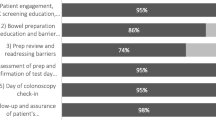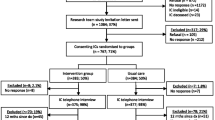Abstract
OBJECTIVES
Among patients unlikely to attend a scheduled colonoscopy, we examined the impact of peer coach versus educational brochure support and compared these with concurrent patients who did not receive support.
METHODS
From health system data, we identified 275 consecutive patients aged >50 who kept <75% of visits to 4 primary care practices and scheduled for a first colonoscopy from February 1, 2005 to August 31, 2006. Using block randomization, we assigned consenting patients to a phone call by a peer coach trained to address barriers to attendance or to a mailed colonoscopy brochure. Study data came from electronic medical records. Odds ratios of colonoscopy attendance were adjusted for demographic, clinical, and health care factors.
RESULTS
Colonoscopy attendance by the peer coach group (N = 70) and brochure group (N = 66) differed by 11% (68.6% vs 57.6%, respectively). Compared with the brochure group, the peer coach group had over twofold greater adjusted odds ratio (AOR) of attendance (2.14, 95% confidence interval [CI] = 0.99–4.63) as did 49 patients who met the prespecified criteria for needing no support (2.68, 95%CI = 1.05–6.82) but the AORs did not differ significantly for 41 patients who declined support (0.61, 95%CI = 0.25–1.45) and 49 patients who could not be contacted (0.85, 95%CI = 0.36–2.02). Attendance was less likely for black versus white race (AOR = 0.37, 95%CI = 0.19–0.72) but more likely for patients with high versus low primary care visit adherence (AOR = 2.30, 95%CI = 1.04–5.07).
CONCLUSION
For patients who often fail to keep appointments, peer coach support appears to promote colonoscopy attendance more than an educational brochure.

Similar content being viewed by others
REFERENCES
American Cancer Society. Colorectal cancer facts and figures special edition. Atlanta: American Cancer Society; 2005. http://www.cancer.org/downloads/STT/CAFF2005CR4PWSecured.pdf. Accessed May 1, 2007.
Seeff LC, Nadel MR, Klabunde CN, et al. Patterns and predictors of colorectal cancer test use in the adult U.S. population. Cancer. 2004;15:2093–103.
Lafata JE, Williams LK, Ben-Menachem T, Moon C, Divine G. Colorectal carcinoma screening procedure use among primary care patients. Cancer. 2005;104:1356–61.
Turner BJ, Weiner M, Yang C, TenHave T. Predicting adherence to colonoscopy or flexible sigmoidoscopy on the basis of physician appointment-keeping behavior. Ann Intern Med. 2004;6:140:528–32.
Denberg TD, Melhado TV, Coombes JM, et al. Predictors of nonadherence to screening colonoscopy. J Gen Intern Med. 2005;20:989–95.
Kelly RB, Shank JC. Adherence to screening flexible sigmoidoscopy in asymptomatic patients. Med Care. 1992;30:1029–42.
Bastani R, Gallardo NV, Maxwell AE. Barriers to colorectal cancer screening among ethnically diverse high- and average-risk individuals. J Psychosoc Oncol. 2001;19:65–84
Nicholson FB, Korma MG. Comparison of endoscopic procedures for colorectal cancer screening in women with mammography and Pap smear. Gastrointest Endosc. 2004;60:400–7.
Wee CC, McCarthy EP, Phillips RS. Factors associated with colon cancer screening: the role of patient factors and physician counseling. Prev Med. 2005;41:23–9.
Canada R, Turner BJ. Talking to patients about screening colonoscopy—where conversations fall short. J Fam Pract. 2007;56:e1–9.
Miller SM, Siejak KK, Schroeder CM, Lerman C, Hernandez E, Helm CW. Enhancing adherence following abnormal Pap smears among low-income minority women: a preventive telephone counseling strategy. J Natl Cancer Inst. 1997;89:703–8.
Battaglia TA, Roloff K, Posner MA, Freund KM. Improving follow-up to abnormal breast cancer screening in an urban population: a patient navigation intervention. Cancer. 2007;109:359–67.
Nash D, Azeez S, Vlahov D, Schori M. Evaluation of an intervention to increase screening colonoscopy in an urban public hospital setting. J Urban Health. 2006;83:231–43.
Jandorf L, Gutierrez Y, Lopez J, Christie J, Itzkowitz SH. Use of a patient navigator to increase colorectal cancer screening in an urban neighborhood health clinic. J Urban Health. 2005;82:216–24.
Steinberg ML, Fremont A, Khan DC, et al. Lay patient navigator program implementation for equal access to cancer care and clinical trials: essential steps and initial challenges. Cancer. 2006;107:2669–77.
Mahajan RJ, Agrawal S, Barthel JS, Marshall JB. Are patients who undergo open-access endoscopy more anxious about their procedures than patients referred from the GI clinic? Am J Gastroenterol. 1996;91:2505–8.
Azjen, I. The theory of planned behavior. Organ Behav Hum Decis Process. 1991;50:179–211.
Denberg TD, Coombes JM, Byers TE, et al. Effect of a mailed brochure on appointment-keeping for screening colonoscopy: a randomized trial. Ann Intern Med. 2006;145:895–900.
Miller WR, Rollnick S. Motivational Interviewing: Preparing People for Change. 2nd ed. New York: Guilford Press; 2002.
Basch CE, Wolf RL, Brouse CH, et al. Telephone outreach to increase colorectal cancer screening in an urban minority population. Am J Public Health. 2006;96:2246–53.
Wardle J, Williamson S, McCaffery K, et al. Increasing attendance at colorectal cancer screening: testing the efficacy of a mailed, psychoeducational intervention in a community sample of older adults. Health Psychol. 2003;22:99–105.
Zapka JG, Lemon SC, Puleo E, et al. Patient education for colon cancer screening: a randomized trial of a video mailed before a physical examination. Ann Intern Med. 2004;141:683–92.
Harewood GC, Wiersema MJ, Melton LJ 3rd. A prospective, controlled assessment of factors influencing acceptance of screening colonoscopy. Am J Gastroenterol. 2002;97:3186–94.
Thoits PA. Social support as coping assistance. J Consult Clin Psychol. 1986;54;416–23.
Weinrich SP, Boyd MD, Weinrich M, et al. Increasing prostate cancer screening in African American men with peer-educator and client-navigator interventions. J Cancer Educ. 1998;13:213–19.
Rubak S, Sandbaek A, Lauritzen T, Christensen B. Motivational interviewing: a systematic review and meta-analysis. Br J Gen Pract. 2005;55:305–12.
Schenck AP, Klabunde CN, Davis WW. Racial differences in colorectal cancer test use by Medicare consumers. Am J Prev Med. 2006;30:320–6.
Neal RD, Lawlor DA, Allgar V, et al. Missed appointments in general practice: retrospective data analysis from four practices. Br J Gen Pract. 2001;51:830–2
Acknowledgements
We would like to thank our funding source, Presbyterian Medical Center’s Bach Fund. We would also like to honor the memory of Radhika Srinivasan MD who contributed her expertise to training the peer coaches. We also thank David Weinberg, MD, MSCE for the comments on an earlier draft of the paper and our hardworking peer coaches.
Conflicts of Interest
None disclosed.
Author information
Authors and Affiliations
Corresponding author
Rights and permissions
About this article
Cite this article
Turner, B.J., Weiner, M., Berry, S.D. et al. Overcoming Poor Attendance to First Scheduled Colonoscopy: A Randomized Trial of Peer Coach or Brochure Support. J GEN INTERN MED 23, 58–63 (2008). https://doi.org/10.1007/s11606-007-0445-4
Received:
Revised:
Accepted:
Published:
Issue Date:
DOI: https://doi.org/10.1007/s11606-007-0445-4




